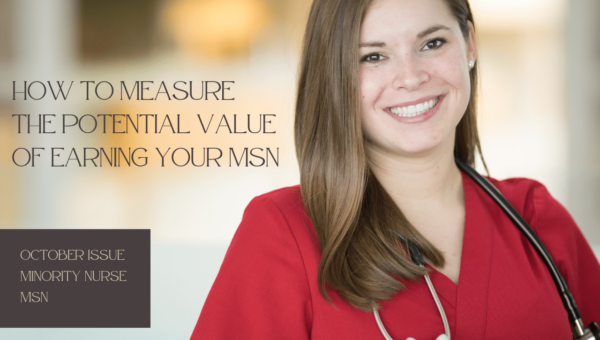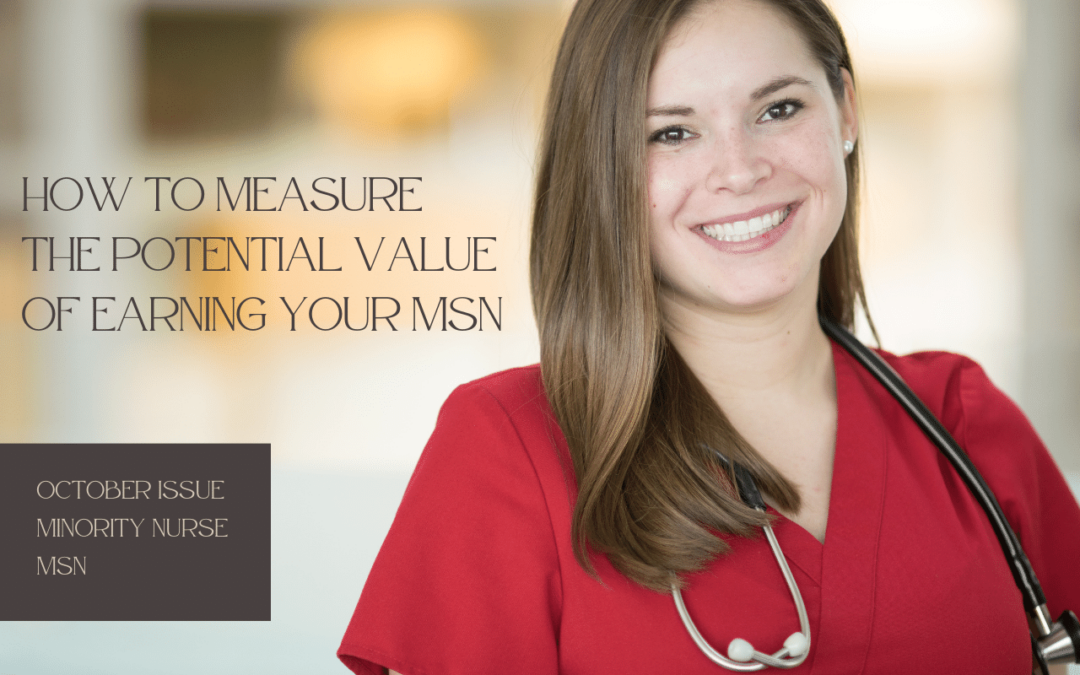Nurses have an embarrassment of riches to choose from when planning their nursing education journey and professional career in healthcare. From entry-level Certified Nursing Assistant (CNA) to a terminal degree like a PhD or Doctor of Nursing Practice (DNP), there are a myriad of pathways in the nursing profession.
For many nurses, a Master of Science in Nursing (MSN) degree is an achievable goal worth the effort in terms of the return on investment it can offer. But how can you measure the potential value of earning your MSN?
Why the MSN?
With nursing becoming increasingly complex in this new millennium, nurses are expected to have a broader scope of knowledge, more skill and
expertise, and the ability to be dynamic leaders within a multidisciplinary industry, whether that leadership comes from an official title or simply through a nurse’s words and deeds.An MSN is an advanced degree that can open many doors for an ambitious nurse seeking increased knowledge and expertise. Often, but not always, more nursing education brings a relative increase in career opportunities and earning power, and the MSN is no exception.
Having a master’s degree creates a certain level of credibility in the eyes of patients, nursing, and non-nursing colleagues, and the value of professional credibility cannot be overstated.
Damion K. Jenkins, MSN, RN, is a nurse educator, nurse career coach, mentor, and author. He states, “My MSN in nursing education provided me with essential insight, knowledge, and skills that have been imperative throughout my career as a nurse educator.”
In terms of any further return on investment for earning his MSN, Jenkins adds, “My education has offered me many opportunities to position myself into nursing leadership positions where I can make tremendous positive impact in all areas of nursing practice. From bedside nursing to academic nursing to clinical administration, I have fully leveraged everything my MSN education and training offered. I’m not so sure I’d be as successful as I am today without the privilege to receive this extremely valuable education.”
The American Association of Colleges of Nursing (AACN) also says it well:
“Beyond the professional opportunities nurses gain through graduate education, there are some tangible benefits to one’s quality of life. Nurses with advanced preparation typically enjoy more opportunities to impact the overall design and implementation of care. As education increases, salaries follow suit. Nurses with master’s degrees can command six-figure salaries and often rise to the top of healthcare’s leadership ranks. With new practice opportunities emerging and the demand for highly specialized nursing skills rising, the time is right for you to begin your graduate-level nursing education. The earlier in your career you complete your formal education, the longer your professional life and the higher your lifetime earnings will be.”
The AACN is a cheerleader of the drive toward a growing body of master’s-prepared nursing professionals. They continue:
“The American Association of Colleges of Nursing (AACN) encourages all nurses to strive for higher levels of education to advance their capacity to enhance the quality of care available to our nation’s diverse patient populations. Calls for more nurses with graduate-level preparation are coming from inside and outside the profession from authorities as diverse as the Institute of Medicine, the Robert Wood Johnson Foundation, and the Carnegie Foundation for the Advancement of Teaching. Now is the time to invest in your future and begin your journey into graduate nursing education.”
There is no question of the potential value of the MSN. But what about the value of the MSN for you?
The MSN: What’s in it for You?
What can an MSN mean for you? There’s a lot to chew on since the number of choices is growing. Let’s examine a few.
The rising importance of nurse practitioners (NPs), also known as advanced practice registered nurses (APRNs), cannot be denied. That said, there are multiple roads a nurse can choose as an APRN, including:
- Family Nurse Practitioner (FNP)
- Certified Nurse Midwife (CNM)
- Adult-Gerontology Primary Care Nurse Practitioner (AGPCNP)
- Adult-Gerontology Acute Care Nurse Practitioner (AGACNP)
- Certified Registered Nurse Anesthetist (CRNA)
- Clinical Nurse Specialist (CNS)
- Acute Care Pediatric Nurse Practitioner (PNP-AC)
- Primary Care Pediatric Nurse Practitioner (PNP-PC)
- Neonatal Nurse Practitioner (NNP)
- Women’s Health Nurse Practitioner (WHNP)
- Psychiatric Mental Health Nurse Practitioner (PMHNP)
For a non-APRN MSN, there is another dizzying array of choices, including, but not limited to:
- MSN, Public Health Nursing
- MSN, Nursing Education
- MSN, Health Informatics, or Nursing Informatics
- MSN, Health Care Quality & Patient Safety
- MSN, Nursing Leadership in Health Care Systems
- MBA & MSN, Nursing Leadership in Health Care Systems
- MSN, Care Coordination
- MSN, Nursing Leadership and Administration
Informatics, leadership, systems, safety, and quality are areas where many nurses are making a difference, and an MSN is a pathway to these types of positions.
Show Me the Money
In terms of earning power and job growth, we can attest from the data that a master’s degree in nursing can increase the amount of money a nurse can make, especially for APRNs.
According to the Bureau of Labor Statistics, the breakdown shows us the reality:
- Nurse practitioners, nurse anesthetists, and nurse midwives earn a median annual salary of $123,780, a mean hourly wage of $59.51, and have projected job growth of 40% (much faster than average) through 2031.
- Registered nurses earn a median annual salary of $77,600, a mean hourly wage of $37.31, and have projected job growth of 6% (as fast as average) through 2031.
For other MSN roles, Indeed reports that a nurse manager earns an average of $78,474 per year, and a research nurse earns an average of $79,610. From these numbers, we can see that the earning power of an APRN far outstrips that of the nurse manager or nurse researcher, who earns the same annual salary as a registered nurse despite a higher level of education and potentially a much higher level of debt in student loans. (We are, of course, assuming that the researcher and manager have an MSN.)
Numbers are approximate for some regions of the country and every facet of healthcare and related industries, and there are always opportunities outside of the norm.
Consider This
We can say with much clarity that, when considering pursuing an MSN, you’ll want to do your homework in terms of what your earning potential will be, what opportunities exist for that nursing specialty, and how satisfied you might be in the particular role that your chosen MSN program will prepare you for.
Networking, speaking with school representatives, working with a career coach or counselor, and doing your due diligence and research are all prudent uses of your time and energy before you sign on the dotted line and enter an MSN program.
There’s a plethora of choices in the world of MSN education, and you’ll want to make the best choice for the life and career you’re inspired to create.
Read the October issue of Minority Nurse focusing on the MSN and Magnet Hospitals here.
Sign up now to get your free digital subscription to Minority Nurse.
- The Road to Becoming an FNP - April 22, 2024
- Embracing Cultural Competence and Cultural Safety - April 17, 2024
- Advancing Your Nursing Career Through Certifications - March 25, 2024



